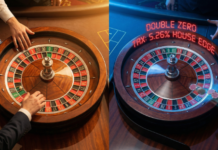Casino games are more than just about luck or strategy; they tap into the psychology of players, influencing their behavior and decision-making. Whether it’s the thrill of a big win or the risk of a loss, understanding the psychological factors that affect players can help casinos design better games and enhance player engagement. In this article, we will explore the psychological elements that drive players to casinos and how these factors impact their gameplay.
The Role of Dopamine in Gambling
Dopamine is a neurotransmitter that plays a significant role in the brain’s reward system. When players win or experience exciting moments in casino games, dopamine is released, creating feelings of pleasure and satisfaction. This positive reinforcement can lead to a cycle where players continue to chase the thrill of a win. Slot machines, particularly slot gacor, are designed to trigger this dopamine release, making them highly addictive for players who seek that rush.
The Illusion of Control in Gambling
One of the psychological phenomena that influence casino players is the illusion of control. Even in games of pure chance, like slots or roulette, players often believe that their actions or strategies can influence the outcome. This belief can lead to more prolonged and repeated play. For example, players may feel that they can “choose” the right slot gacor machine or table game based on certain behaviors, even though the results are entirely random.
Loss Aversion and Risk-Taking
Loss aversion refers to the tendency for people to prefer avoiding losses over acquiring equivalent gains. In gambling, this psychological principle often leads to players continuing to bet in an attempt to recover their losses. Players may increase their bets after losing in hopes of turning things around, which can lead to higher risks and more significant losses. Casinos are aware of this tendency and design games and rewards systems to encourage this behavior, ultimately keeping players engaged for longer periods.
The Social Aspect of Casino Gambling
For many players, casinos are social environments. Interacting with other players, sharing wins or losses, and experiencing the collective excitement of a casino atmosphere can enhance the overall gaming experience. Online casinos also tap into this by offering live dealer games, where players can interact with real dealers and other players in real-time. The social aspect of gambling can keep players coming back, as it satisfies their need for social interaction and entertainment.
The Use of Music and Sounds in Casinos
Casinos are designed to create a specific atmosphere that encourages players to stay longer and spend more. Music, sound effects, and lighting are all strategically chosen to evoke excitement and anticipation. The sounds of coins or jackpots ringing in slot gacor machines create a sense of success and achievement, even when the player has not won a large amount. The combination of sensory stimulation, including sounds and lights, keeps players engaged and immersed in the experience.
The Power of Variable Reinforcement
One of the most powerful psychological strategies used by casinos is variable reinforcement. In games like slot machines, players do not win consistently but rather experience intermittent rewards. This unpredictability creates an exciting challenge, as players never know when the next win will come. This “gambling loop” can lead to compulsive gambling, as players continue to play in the hopes of hitting the next big win.
The ‘Hot Hand’ Fallacy
The ‘hot hand’ fallacy is the belief that after a series of wins, players are on a “winning streak” and that their luck will continue. This fallacy can lead to overconfidence and riskier bets. It is particularly prevalent in games like blackjack or poker, where players believe their momentum will carry them to more wins. In reality, every spin or hand in most casino games is independent, and previous outcomes do not influence future results.
The Role of situs slot gacor in Player Psychology
Some players are particularly drawn to certain types of slot machines, like situs slot gacor, which are known for their high payout rates and frequent bonus features. These games provide a psychological advantage, as they offer the possibility of frequent wins or large jackpots, even though they are still governed by chance. The presence of attractive bonuses and features on these machines makes them more appealing to players, enhancing their overall gaming experience.
Conclusion
The psychology behind casino games is complex and deeply ingrained in the way games are designed and played. From dopamine release to the illusion of control, casinos understand how to manipulate players’ emotions and behaviors to keep them engaged. By understanding these psychological factors, players can make more informed decisions and avoid falling into the traps that keep them coming back for more. As the casino industry continues to grow, it is clear that understanding the psychology behind gambling will be key to its success.




